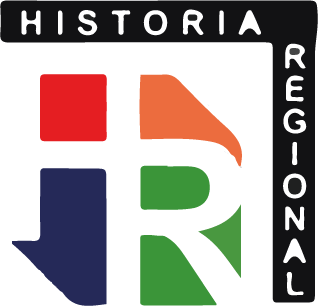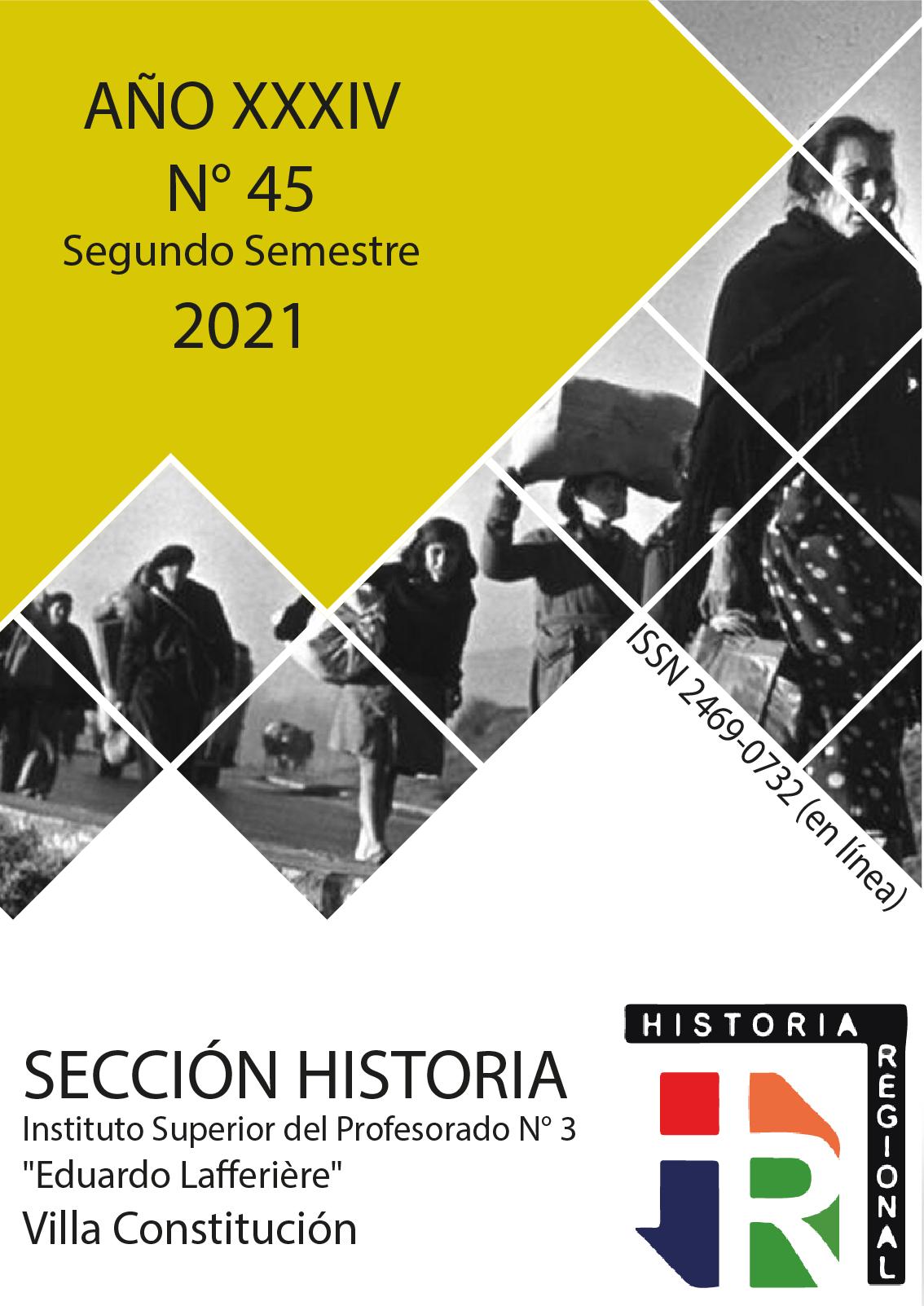A Peronist “buen muchacho”: notes on an Orthodox Peronist asylum in Brazil
Main Article Content
Abstract
The objective of this article is to make a first historical flight on the trajectory of Argentine journalist José Maria Villon in Brazil, from 1958 to the early 1970s. He participated in the third government of Juan D. Perón (1973-1974) with the rise of José López Rega, head of the extremist group Triple A, one of the most powerful people in the Peronist circle because of his influence on Isabel Perón. Villon was part of that environment. The discovery of unpublished documents that register Villon's presence in the community of Argentines residing in southern Brazil and, later, his reappearance in documents of the Brazilian repression, pointed to an intriguing object of investigation. The research aimed to build a historical-biographical narrative and the plurality of sources is a feature of this article, being obtained both from the print media, as well as from private document collections and repressive archives.
Downloads
Download data is not yet available.
Article Details
How to Cite
Fernández, J. C. (2021). A Peronist “buen muchacho”: notes on an Orthodox Peronist asylum in Brazil. Historia Regional, (45), 1-13. Retrieved from https://historiaregional.org/ojs/index.php/historiaregional/article/view/557
Section
Dossier

This work is licensed under a Creative Commons Attribution 4.0 International License.
Los autores que publican en esta revista están de acuerdo con los siguientes términos:
- Los autores conservan los derechos de autor y garantizan a la revista el derecho de ser la primera publicación del trabajo al igual que licenciado bajo una Creative Commons Attribution License que permite a otros compartir el trabajo con un reconocimiento de la autoría del trabajo y la publicación inicial en esta revista.
- Los autores pueden establecer por separado acuerdos adicionales para la distribución no exclusiva de la versión de la obra publicada en la revista (por ejemplo, situarlo en un repositorio institucional o publicarlo en un libro), con un reconocimiento de su publicación inicial en esta revista.
- Se permite y se anima a los autores a difundir sus trabajos electrónicamente (por ejemplo, en repositorios institucionales o en su propio sitio web) antes y durante el proceso de envío, ya que puede dar lugar a intercambios productivos, así como a una citación más temprana y mayor de los trabajos publicados (Véase The Effect of Open Access) (en inglés).
References
Anguita, E.; Caparrós, M. (2006) La voluntad. Una historia de la militancia revolucionaria en Argentina: La patria peronista, 1974-1976. Tomo IV, Buenos Aires: Booket.
Centro de Estudios Legales y Sociales. (1982) El secuestro como método de detención. Buenos Aires: Centro de Estudios Legales y Sociales.
Fernández, J. C. (2011) Anclaos en Brasil: A presença argentina no Rio Grande do Sul, 1966-1989. (Tese de Doutorado). Universidade Federal do Rio Grande do Sul, Porto Alegre, Brasil.
Garcia, T. da C. (2015) Mundo Radial e o cancioneiro folclórico nos tempos de Perón. Nuevo Mundo Mundos Nuevos [En ligne], Images, mémoires et sons. Recuperado de: http://nuevomundo.revues.org/68075; DOI: 10.4000/nuevomundo.68075
Guterman, M. (2016) Nazistas entre nós: a trajetória dos oficiais de Hitler depois da guerra. São Paulo: Contexto.
Larraquy, M. (2007) Lopez Rega, el peronismo y la Triple A. Buenos Aires: Punto de Lectura, 2007.
Melón Pirro, J. C. (2005) Lo que se dice de lo que es. Reflexiones públicas sobre el peronismo después de 1955, Prohistoria, IX (9),131-152. Recuperado de: https://dialnet.unirioja.es/descarga/articulo/2188734.pdf
Quesada, M. S. de (2003) Isabel Perón. La Argentina en los años de Maria Estela Martinez. BSAS: Planeta.
Santos, R. G. C. dos (2015) A construção da ameaça justicialista. Antiperonismo, política e imprensa no Brasil (1945-1955). (Tese de Doutorado). Faculdade de Filosofia, Letras e Ciências Humanas da Universidade de São Paulo, São Paulo, Brasil.
Yofre, J. B. (2006) Nadie Fué: Crónicas, documentos y testimonios de los últimos meses, los últimos días, las últimas horas de Isabel Perón en el poder. Buenos Aires: el autor.
Viau, S. La historia de una banda impune. Página 12, Edición Digital, 07/01/2007. Recuperado de: http://www.pagina12.com.ar/diario/elpais/1-78775-2007-01-07.html
Ruiz Guiñazú, M. (2006) "Jamás imaginamos lo que iba a ocurrir". La Nación, 19 de marzo de 2006. Recuperado de: http://www.lanacion.com.ar/789809-jamas-imaginamos-lo-que-iba-a-ocurrir
Mc Sherry P. J. (2009) Los Estados depredadores: la Operación Cóndor y la guerra encubierta en la America Latina. Montevideo: La Banda Oriental.
Centro de Estudios Legales y Sociales. (1982) El secuestro como método de detención. Buenos Aires: Centro de Estudios Legales y Sociales.
Fernández, J. C. (2011) Anclaos en Brasil: A presença argentina no Rio Grande do Sul, 1966-1989. (Tese de Doutorado). Universidade Federal do Rio Grande do Sul, Porto Alegre, Brasil.
Garcia, T. da C. (2015) Mundo Radial e o cancioneiro folclórico nos tempos de Perón. Nuevo Mundo Mundos Nuevos [En ligne], Images, mémoires et sons. Recuperado de: http://nuevomundo.revues.org/68075; DOI: 10.4000/nuevomundo.68075
Guterman, M. (2016) Nazistas entre nós: a trajetória dos oficiais de Hitler depois da guerra. São Paulo: Contexto.
Larraquy, M. (2007) Lopez Rega, el peronismo y la Triple A. Buenos Aires: Punto de Lectura, 2007.
Melón Pirro, J. C. (2005) Lo que se dice de lo que es. Reflexiones públicas sobre el peronismo después de 1955, Prohistoria, IX (9),131-152. Recuperado de: https://dialnet.unirioja.es/descarga/articulo/2188734.pdf
Quesada, M. S. de (2003) Isabel Perón. La Argentina en los años de Maria Estela Martinez. BSAS: Planeta.
Santos, R. G. C. dos (2015) A construção da ameaça justicialista. Antiperonismo, política e imprensa no Brasil (1945-1955). (Tese de Doutorado). Faculdade de Filosofia, Letras e Ciências Humanas da Universidade de São Paulo, São Paulo, Brasil.
Yofre, J. B. (2006) Nadie Fué: Crónicas, documentos y testimonios de los últimos meses, los últimos días, las últimas horas de Isabel Perón en el poder. Buenos Aires: el autor.
Viau, S. La historia de una banda impune. Página 12, Edición Digital, 07/01/2007. Recuperado de: http://www.pagina12.com.ar/diario/elpais/1-78775-2007-01-07.html
Ruiz Guiñazú, M. (2006) "Jamás imaginamos lo que iba a ocurrir". La Nación, 19 de marzo de 2006. Recuperado de: http://www.lanacion.com.ar/789809-jamas-imaginamos-lo-que-iba-a-ocurrir
Mc Sherry P. J. (2009) Los Estados depredadores: la Operación Cóndor y la guerra encubierta en la America Latina. Montevideo: La Banda Oriental.

